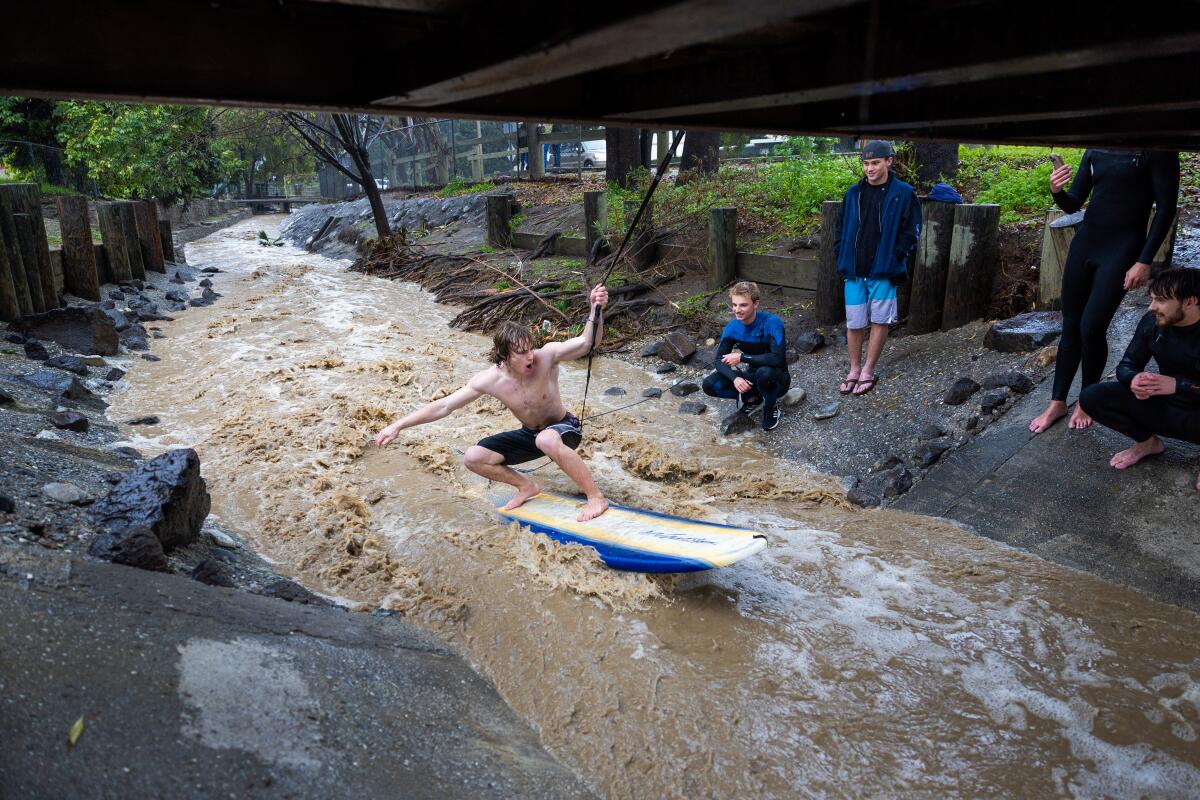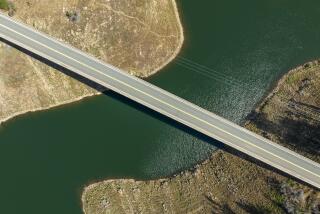California granted federal disaster relief for historic February storms

- Share via
President Biden has approved California’s request for a major disaster declaration to support recovery efforts from a string of February storms that drenched much of the state with historic rainfall and mountain snow and resulted in numerous deaths, officials announced Sunday.
Nine California counties — Butte, Glenn, Los Angeles, Monterey, San Luis Obispo, Santa Barbara, Santa Cruz, Sutter and Ventura — will receive federal aid as a result of the declaration, which also includes funding for statewide hazard mitigation efforts, officials said.
“This declaration brings in more resources for local communities across the state recovering from the widespread impacts of these storms,” Gov. Gavin Newsom said in a statement thanking the Biden administration for its support.
At least 11 people died as a result of the storms, which caused widespread flooding, power outages, school closures and damage to critical infrastructure, Newsom wrote in his request for a disaster declaration.
In San Luis Obispo County, where two tornados touched down, the storms damaged eight steel firehouse bay doors and the roof and gutters of the Grover Beach Police Department, and high waves caused major structural damage to the Cayucos Pier, compromising its integrity, Newsom wrote.
In Santa Barbara County, high winds damaged homes in Goleta and tore off part of a windmill in Solvang, and rain overwhelmed concrete channels that divert water from residential areas, destroying 300 linear feet of them, Newsom wrote. Sediment from debris flows filled three debris basins to near capacity, threatening to flood an airport runway, and a section of channel bank of the Zanja de Cota Creek collapsed, sending trees and debris into the waterway on the Chumash Indian reservation, Newsom wrote.
In Ventura County, flooding damaged roads, bridges, levees and park facilities, inundating the Ventura Wastewater Facility and causing water to backflow into the system, Newsom wrote. Flooding also overwhelmed culverts and washed out a fish bypass basin that enables steelhead to journey along the Ventura River, while debris flows blocked roads and overwhelmed debris basins with sediment. The Ventura River flooded and altered its course, with the new path washing out a road and embankment and destroying an above-ground water distribution system, Newsom wrote.
Los Angeles County saw hundreds of debris flows, prompting evacuations. The Hyperion Water Reclamation Plant was inundated with stormwater, which caused an excess of pressure in a sewer line that sent sewage up from manhole covers, flooding portions of the facility and at one point causing the filtration system to shut down, Newsom wrote. The storm also damaged electrical equipment in one building, forcing the plant to borrow power to continue operations, he wrote.
In Santa Cruz County, high winds toppled a eucalyptus tree, severing a 10-inch steel aerial sewer main, and heavy surf damaged a municipal wharf in the city of Santa Cruz, collapsing a portion of its deck, Newsom wrote.
In Monterey County, heavy rain in burn scars sent silt and debris into catch basins and stormwater conveyance systems, overwhelming them and resulting in tens of thousands of cubic yards of material that had to be trucked long distance for disposal, Newsom wrote.
In Butte County, wind and rain downed trees, damaging roads and guardrails and at least one culvert. The worst of the damage took place in the burn scars of the Bear and Camp fires, which cover roughly 40% of the county, Newsom wrote. Glenn County’s airport was damaged by heavy rain, while Sutter County’s Yuba Fairgrounds were severely damaged when a 15-foot redwood tree fell on a restroom building.
More to Read
Sign up for Essential California
The most important California stories and recommendations in your inbox every morning.
You may occasionally receive promotional content from the Los Angeles Times.









